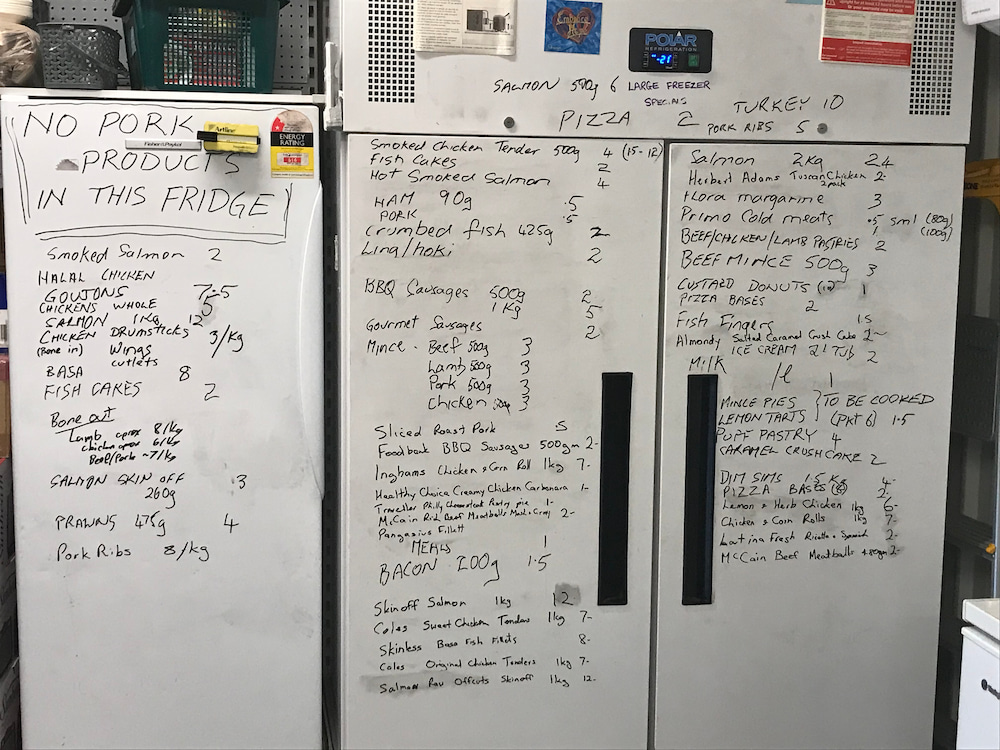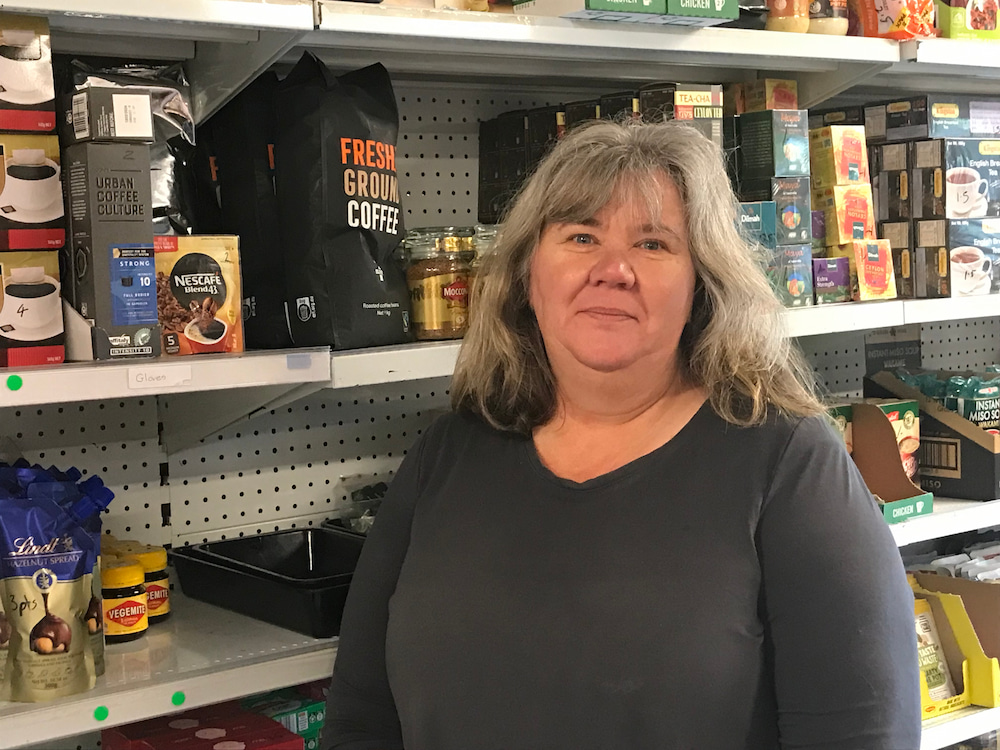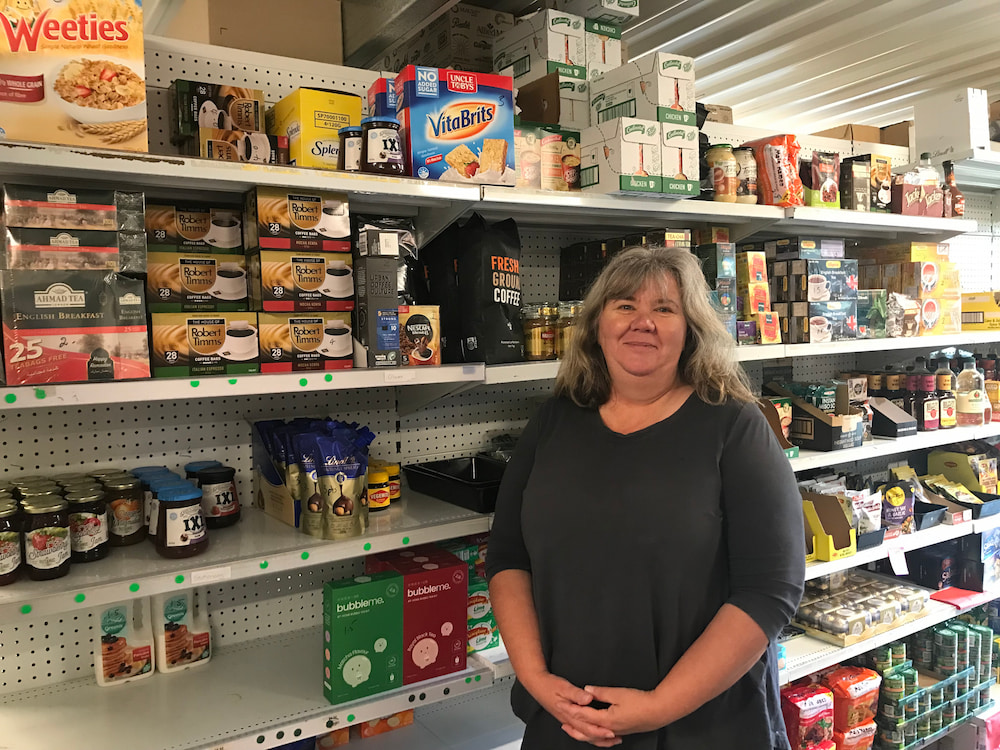Last year, according to Volunteering ACT, 12,500 Canberrans, including children, ran out of food, because of rising living costs.
“It’s becoming desperate,” says lay minister Kirsty Baker, who runs the Tuckerbox co-op at Holy Cross Anglican Church in Hackett. It is one of a network of food pantries across the city.
Every Saturday, hundreds of people come from around the ACT and nearby towns to buy their groceries from the Tuckerbox at discounted rates – on average, one-fifth of what supermarkets charge.
In the 13 years Ms Baker has managed the Tuckerbox, demand has never been higher, she says.
“To give a dollar value, because we’ve barely changed the price in 13 years, our members used to have an average spend of $4 or $5; now, it’s closer to $30,” Ms Baker says.
Each household pays $2 a year to use the Tuckerbox. It sells tinned and packeted goods, cold and frozen items (at the moment, the freezer is full of squid); meat and fish (salmon, for instance, costs $12 a kilogram – “a healthy meal choice, more affordable than commercial salmon”); toiletries and cleaning products; first aid items; and homewares. Fruit, vegetables, and bread – donated by OzHarvest Canberra – are free.
The Tuckerbox buys most of its food from Foodbank NSW/ACT, but the supply is “completely inadequate for the demand”, Ms Baker says. “If I could triple that, it would help make a big impact for our people.”
The Tuckerbox has a mixed demographic: “It’s single people, couples, families, from all sorts of circumstances and situations,” she says.
Even once affordable regions in Canberra have become expensive, Ms Baker remarks. Ainslie, once a suburb of workers’ cottages, or Hackett, once the ‘boondocks’, are now inner city and fashionable places to live; and people who bought homes there decades ago find themselves paying high rates.
“People on pensions have worked hard all their lives; they have busted a gut, and thought they would be OK in retirement.”
But people who work are the increasing demographic, Ms Baker notes – including middle-class white-collar workers.
“These people who once upon a time would have given, are now struggling…”
Some members are only one pay away from financial disaster. “Sometimes we have people counting silver coins to do shopping. There’s not a lot of money when you’ve got silver.”
Others have only $10 or $20 to feed their family, some only $5. “It is happening every single week… At the end of the day, these people need to have money to bulk out the meals and make them healthier.”
As a former single mother, Ms Baker knows what it means to struggle to make ends meet.
“I understand what it’s like to be scrounging around trying to find any money anywhere, so I can buy milk and feed my children. I know what it’s like as a parent to not eat because I want to make sure my children eat… If there was this opportunity when I was a single parent, the difference that would have made!”

Without the Tuckerbox, many of their members would be unable to eat healthy meals. Some could not afford fruit and vegetables; eggs, an excellent source of protein, have become more expensive; and even the price of baked beans has increased. Instead, carbohydrates become the diet: cheap bread and pasta – food that does not have much nutritional value, and is not filling, so people eat more, Ms Baker says.
“When you’re struggling financially, food becomes a discretionary spend. Healthy food options nearly go out the window.”
In the short term, a poor diet can lead to malnutrition, lethargy, fatigue, and depression; and to stunted growth, obesity, diabetes, and heart disease in the long term. Poor health can keep people in the cycle of poverty, Ms Baker says.
“When you’re hungry, all you’re thinking about is surviving… I don’t think people understand how dire it is and the long-term costs… Some people don’t choose to be unemployed, but they’ve probably become so depressed by their circumstances they can’t move, they’re paralysed by their situation. They’re isolated; they’re eating poorly; so it gets worse. It’s a downward spiral.”
The Tuckerbox provides food relief with dignity.
“People feel like there’s a stigma coming to places like here,” Ms Baker says. “We’re a co-op, we are not a charity. You’re not getting benefits; you’re not taking away from other people… There’s always people doing it worse, but it doesn’t mean we can’t alleviate something for you…
“If you are living pay to pay, and you are not able to tuck money away, then you should be here… You’re not alone in this, and there isn’t a loss of dignity in this.”
A recent survey showed that members buy from 10 to 100 per cent of their groceries from the Tuckerbox; on average, members bought 50 per cent of groceries from there. Very few members accessed other services.
“Just because you come to a pantry doesn’t mean you can’t go to another pantry, because, as we all know, we haven’t got enough food,” Ms Baker says. “We cannot feed everyone, and we don’t have everything.”

Besides food, the Tuckerbox also provides “community and connection”, Ms Baker says. Its Saturday afternoon teas are open to all, not just Tuckerbox customers.
“We have people who come early; they sit under the tree outside, and they just chat – they’re here two to three hours before we kick off, because they want that connection and chat.”
Ms Baker intends to set up a weekly coffee and chat session. She says that during the COVID-19 lockdown, the Tuckerbox was a mental health lifeline for many; it forced them to come out of the house and to connect with people.
Tuckerbox relies on volunteers
The Tuckerbox relies on its volunteers; Ms Baker has an “awesome band” of 36, some in their 80s.
“It’s not just putting food on the shelf; we’re here on Thursday waiting for delivery and getting it ready for Saturday. There are hundreds of hours that go in each week for three hours of service on a Saturday. And we love what we do.”
Nevertheless, the work is tiring. The community could help by volunteering at Tuckerbox, or at their local food pantry, Ms Baker says. Volunteering ACT’s Food Relief Network lists all the food pantries in Canberra.
“On a Saturday, we struggle a little with physical capacity, especially with setting it up and at the end of the day; by then, we are quite exhausted,” Ms Baker says. “It would be nice to have some people come in that last hour and help pack up… Like all things, the more people there are, the quicker the job is done.”
Ms Baker encourages people to donate excess food to pantries or to neighbours in need – whether glut from their gardens, or store-bought food households know they will not use. (Do be mindful of use-by dates, though.) Even a couple of apples would help.
“If every person could donate one or two pieces of fruit or veg to their local place, it would make a difference,” Ms Baker says. “You can’t underestimate the power of a small action.”
The Tuckerbox is self-funded, so financial donations are always welcome (as they are for all the members of the Canberra Food Relief Network). However, the pantry is not tax deductible.
“People who donate to us do it out of sheer kindness and wanting to support this community,” Ms Baker says.
Volunteers helped to pay for Tuckerbox’s new building, which opened in 2022 – one man raised $65,000 through a white elephant stall; others donated large amounts for shelving or slabs.
“These huge costs got covered by these beautiful people; that made a difference for us,” Ms Baker says.
A ‘Socially Crafty’ group raises funds for the Tuckerbox voucher program by selling handcrafted items through the Men’s Shed Dickson. It meets every second Wednesday.
Last year, the Tuckerbox received a $5,000 grant through Hands Across Canberra to buy supplemental fruit and vegetables, while they also benefited from the ACT Government’s $15 million increase in funding for the community sector in this year’s budget.
“We are extremely grateful for that grant, because it is the thing that makes a difference to us as a smaller pantry,” Ms Baker says.
Nevertheless, funding uncertainty is worrying.
“We’ve been told we are guaranteed to the end of the financial year,” Ms Baker says. “I don’t know if people realise the stress that these pantries work under because the funding had gone, and we did not know until a few days to the end of the financial year where we would be.
“If we didn’t have this subsidy, we could close because we couldn’t function.”
The Holy Cross Tuckerbox, Holy Cross Anglican Church Hackett, corner of Antill Street and Phillip Avenue, Hackett, is open Saturday 1-4pm, 50 weeks a year.



